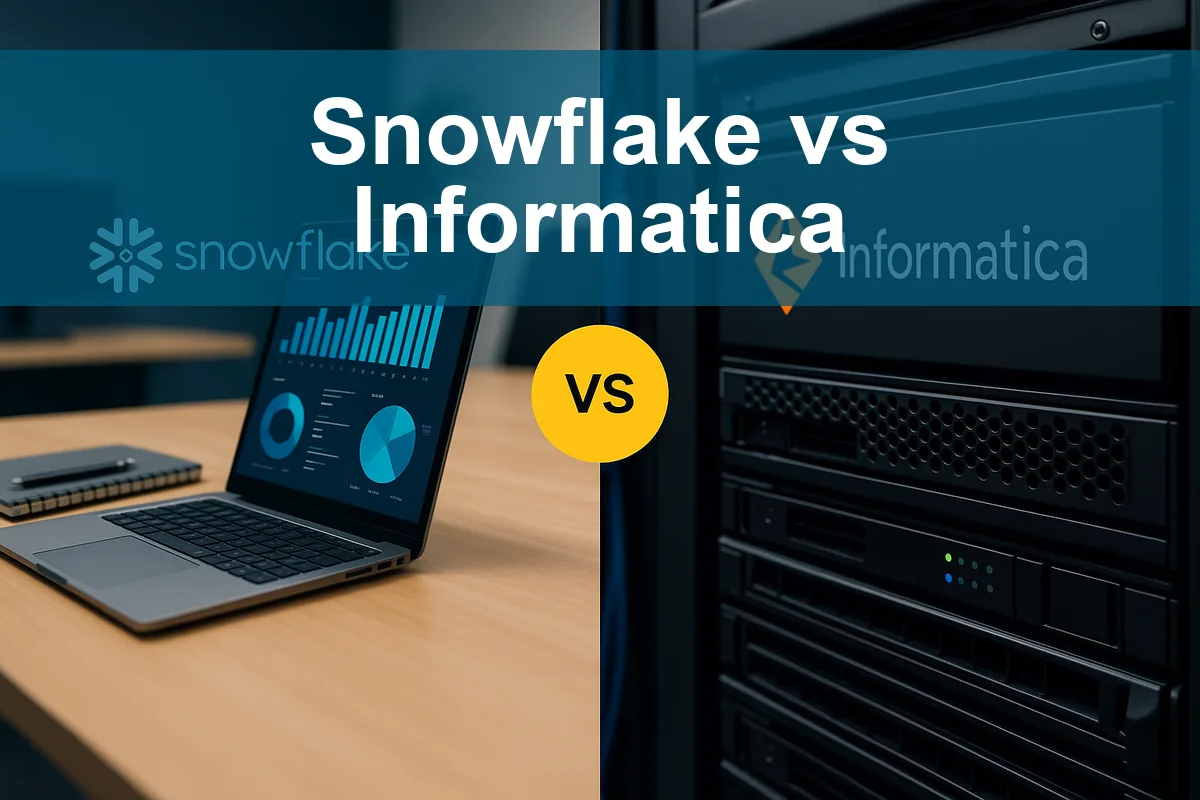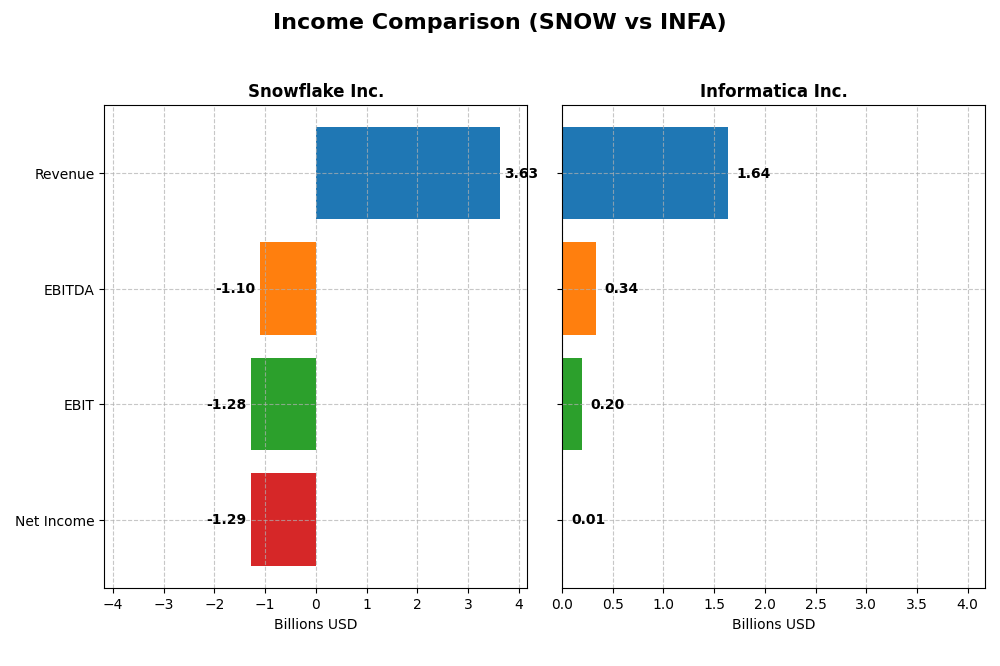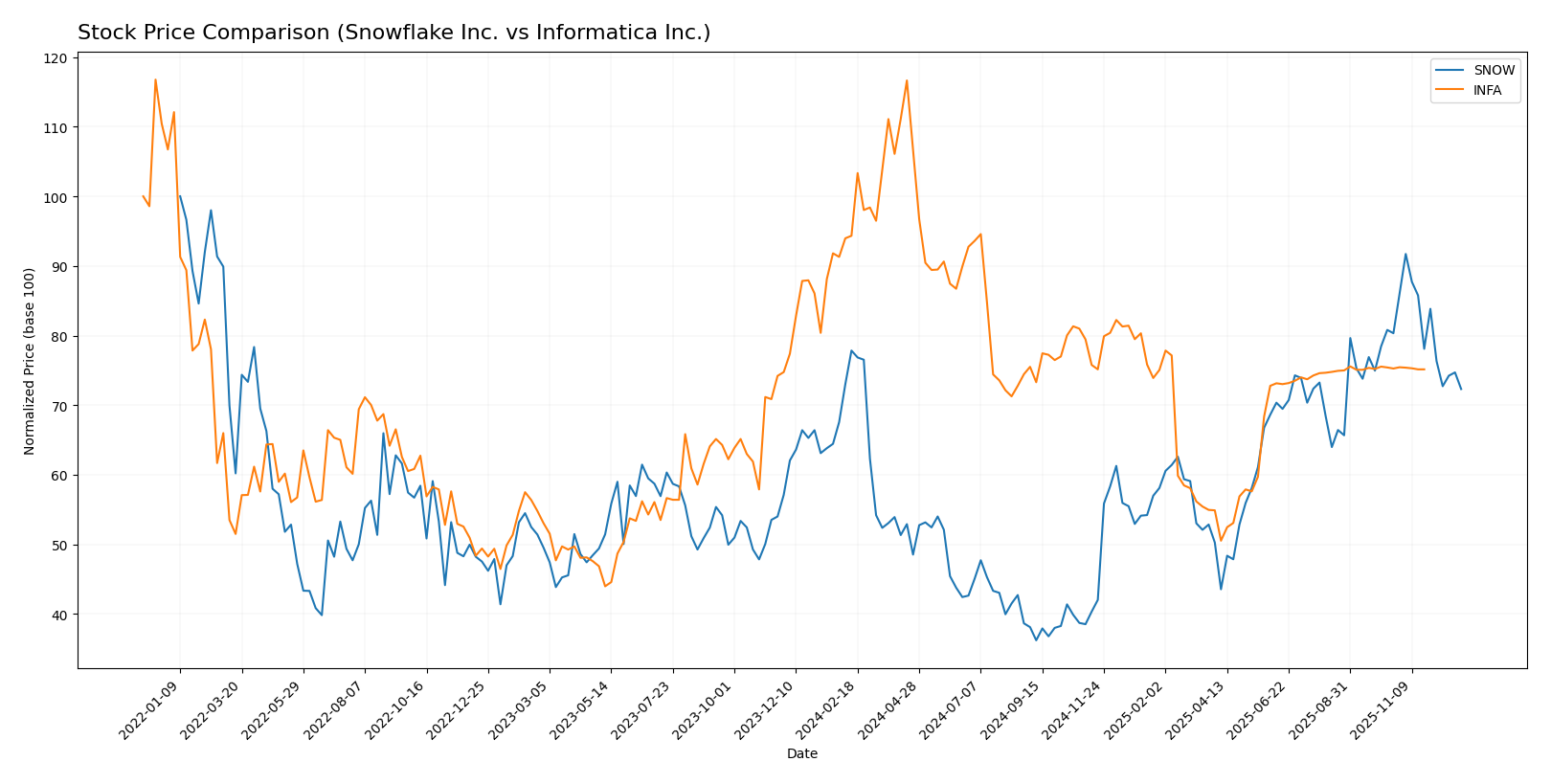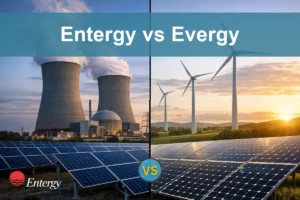In the dynamic world of data management and cloud computing, Snowflake Inc. and Informatica Inc. stand out as key players driving innovation. Snowflake excels with its cloud-based data platform, while Informatica focuses on AI-powered data integration and governance across multi-cloud environments. Both companies cater to enterprises seeking data-driven insights, making their comparison essential. Join me as we explore which stock offers the most compelling opportunity for investors in 2026.

Table of contents
Companies Overview
I will begin the comparison between Snowflake Inc. and Informatica Inc. by providing an overview of these two companies and their main differences.
Snowflake Inc. Overview
Snowflake Inc. operates a cloud-based data platform that enables organizations to consolidate data into a single source of truth for insights, applications, and data sharing. Based in Bozeman, Montana, Snowflake serves a diverse range of industries and company sizes, positioning itself as a key player in the software application sector with a market cap of approximately 72.5B USD as of 2026.
Informatica Inc. Overview
Informatica Inc. develops an AI-powered platform for data management across multi-cloud and hybrid environments at enterprise scale. Headquartered in Redwood City, California, the company offers products for data integration, quality, governance, and master data management, emphasizing a comprehensive approach to enterprise data. Its market cap stands near 7.5B USD, reflecting its role in the software infrastructure industry.
Key similarities and differences
Both companies focus on data management solutions and operate in the technology sector, but Snowflake emphasizes cloud-based data consolidation and sharing, while Informatica offers a broader suite of AI-powered data management and integration products across hybrid environments. Snowflake’s market cap is substantially larger, and it targets a wider range of industries, whereas Informatica centers more on enterprise-scale data governance and application integration.
Income Statement Comparison
The table below compares the most recent fiscal year income statement metrics for Snowflake Inc. and Informatica Inc., providing a clear snapshot of their financial performance.

| Metric | Snowflake Inc. (SNOW) | Informatica Inc. (INFA) |
|---|---|---|
| Market Cap | 72.5B | 7.5B |
| Revenue | 3.63B | 1.64B |
| EBITDA | -1.10B | 339M |
| EBIT | -1.28B | 199M |
| Net Income | -1.29B | 9.93M |
| EPS | -3.86 | 0.033 |
| Fiscal Year | 2025 | 2024 |
Income Statement Interpretations
Snowflake Inc.
Snowflake Inc. has shown strong revenue growth from 592M in 2021 to 3.63B in 2025, a 512.52% increase. However, net income remained negative and worsened to -1.29B in 2025, reflecting ongoing losses despite improving gross margins at 66.5%. The latest year saw revenue growth of 29.21%, but net margin and EPS declined, indicating profitability challenges persist.
Informatica Inc.
Informatica Inc. recorded moderate revenue growth from 1.32B in 2020 to 1.64B in 2024, up 23.95%. Net income improved significantly, reaching 9.93M in 2024 after previous losses, supported by a strong gross margin of 80.11% and positive EBIT margin of 12.15%. The latest year showed slower revenue growth at 2.81% but marked improvements in net margin and EPS, signaling a turnaround.
Which one has the stronger fundamentals?
Informatica exhibits stronger fundamentals with consistent profitability improvements, positive EBIT and net margins, and favorable overall income statement metrics. Snowflake’s rapid revenue expansion contrasts with sustained net losses and negative margins, reflecting higher operational risks. Informatica’s stable margins and growing net income suggest more favorable financial health over the period analyzed.
Financial Ratios Comparison
The table below presents a side-by-side comparison of key financial ratios for Snowflake Inc. (SNOW) and Informatica Inc. (INFA) based on their most recent fiscal year data.
| Ratios | Snowflake Inc. (2025) | Informatica Inc. (2024) |
|---|---|---|
| ROE | -42.9% | 0.43% |
| ROIC | -25.3% | 0.56% |
| P/E | -47.0 | 788.0 |
| P/B | 20.1 | 3.39 |
| Current Ratio | 1.75 | 1.82 |
| Quick Ratio | 1.75 | 1.82 |
| D/E | 0.90 | 0.81 |
| Debt-to-Assets | 29.7% | 35.2% |
| Interest Coverage | -528.0 | 0.87 |
| Asset Turnover | 0.40 | 0.31 |
| Fixed Asset Turnover | 5.53 | 8.75 |
| Payout Ratio | 0 | 0.12% |
| Dividend Yield | 0% | 0.00015% |
Interpretation of the Ratios
Snowflake Inc.
Snowflake’s financial ratios present a mixed picture with some strengths and notable weaknesses. The company shows favorable liquidity ratios (current and quick ratios at 1.75) and a low debt-to-assets ratio of 29.72%, indicating good short-term financial health and manageable leverage. However, profitability metrics such as net margin (-35.45%), return on equity (-42.86%), and return on invested capital (-25.32%) are unfavorable, highlighting operational challenges. Snowflake does not pay dividends, likely reflecting reinvestment in growth and R&D, consistent with its high research and development expense ratio.
Informatica Inc.
Unfortunately, there is no available data to evaluate Informatica’s financial ratios, key metrics, discounted cash flow, or income. This lack of information prevents a meaningful analysis of its financial strength, profitability, or shareholder returns. Investors should consider this absence when comparing Informatica to peers or making investment decisions.
Which one has the best ratios?
Based on the available data, Snowflake demonstrates a clearer financial profile with some favorable liquidity and leverage ratios, despite weak profitability and return metrics. Informatica’s missing data means no direct comparison can be made, so Snowflake’s ratios, while slightly unfavorable overall, provide more insight into its financial condition.
Strategic Positioning
This section compares the strategic positioning of Snowflake Inc. and Informatica Inc., focusing on Market position, Key segments, and Exposure to technological disruption:
Snowflake Inc.
- Leading cloud data platform provider with $72.5B market cap, facing competitive pressure in software applications.
- Revenue driven mainly by cloud data platform products and professional services, focused on data consolidation and analytics.
- Positioned in cloud-based data platforms with potential exposure to evolving cloud and AI tech disruptions.
Informatica Inc.
- Smaller player with $7.5B market cap, competing in software infrastructure under moderate market pressure.
- Revenue from AI-powered data management platform including subscription, licensing, and professional services targeting enterprise data integration.
- Focus on AI-driven multi-cloud and hybrid data management, exposed to disruption in data integration and governance technologies.
Snowflake Inc. vs Informatica Inc. Positioning
Snowflake shows a concentrated focus on cloud data platforms with strong growth in product revenue, while Informatica is more diversified across AI-powered data management and integration services, balancing subscription and licensing revenues.
Which has the best competitive advantage?
Snowflake’s MOAT evaluation indicates a very unfavorable position with declining ROIC and value destruction, while Informatica’s data is insufficient for assessment, limiting conclusions on its competitive advantage.
Stock Comparison
The stock price movements of Snowflake Inc. and Informatica Inc. over the past year reveal contrasting bearish trends with differing volatility and acceleration patterns, reflecting distinct trading dynamics and market responses.

Trend Analysis
Snowflake Inc. (SNOW) exhibited a bearish trend with a -7.1% price change over the past 12 months, showing deceleration in its downward momentum and significant volatility with a 42.98 standard deviation.
Informatica Inc. (INFA) experienced a more pronounced bearish trend, declining -12.68% over the same period, but with accelerating downward momentum and much lower volatility, evidenced by a 4.46 standard deviation.
Comparatively, Snowflake’s stock delivered a higher market price relative to Informatica’s despite both being bearish; Snowflake’s decline was less severe, indicating better relative performance over the year.
Target Prices
Analysts present a clear target price consensus for Snowflake Inc. and Informatica Inc., indicating expected price ranges.
| Company | Target High | Target Low | Consensus |
|---|---|---|---|
| Snowflake Inc. | 325 | 237 | 283.25 |
| Informatica Inc. | 27 | 27 | 27 |
Snowflake’s target consensus of 283.25 suggests significant upside from its current price of 216.71 USD. Informatica’s consensus target of 27 USD is slightly above its current price of 24.79 USD, implying modest growth expectations.
Analyst Opinions Comparison
This section compares analysts’ ratings and grades for Snowflake Inc. and Informatica Inc.:
Rating Comparison
Snowflake Inc. Rating
- Rating: C-, classified as Very Favorable by analysts.
- Discounted Cash Flow Score: 3, indicating a Moderate valuation assessment.
- Return on Equity Score: 1, considered Very Unfavorable for profitability.
- Return on Assets Score: 1, Very Unfavorable, indicating poor asset utilization.
- Debt To Equity Score: 1, Very Unfavorable, reflecting high financial risk.
- Overall Score: 1, rated Very Unfavorable overall financial health.
Informatica Inc. Rating
- No rating data available.
- No score data available.
- No score data available.
- No score data available.
- No score data available.
- No overall score data available.
Which one is the best rated?
Based strictly on the provided data, Snowflake Inc. holds a C- rating with detailed scores, though mostly very unfavorable except for a moderate DCF score. Informatica Inc. has no available rating or score data, making Snowflake the only company with evaluative analyst ratings here.
Scores Comparison
Here is a comparison of the Altman Z-Score and Piotroski Score for Snowflake Inc. and Informatica Inc.:
Snowflake Inc. Scores
- Altman Z-Score: 6.22, indicating a safe zone, low bankruptcy risk.
- Piotroski Score: 4, classified as average financial strength.
Informatica Inc. Scores
- Altman Z-Score: 1.94, indicating a grey zone, moderate bankruptcy risk.
- Piotroski Score: 6, classified as average financial strength.
Which company has the best scores?
Snowflake Inc. shows a stronger financial safety profile with a higher Altman Z-Score in the safe zone, while Informatica Inc. remains in the grey zone. Both companies have average Piotroski Scores, with Informatica scoring slightly higher.
Grades Comparison
The grades awarded to Snowflake Inc. and Informatica Inc. by various reputable grading companies are as follows:
Snowflake Inc. Grades
This table summarizes recent grades assigned to Snowflake Inc. by well-known financial institutions.
| Grading Company | Action | New Grade | Date |
|---|---|---|---|
| Citigroup | Maintain | Buy | 2025-12-08 |
| Needham | Maintain | Buy | 2025-12-04 |
| DA Davidson | Maintain | Buy | 2025-12-04 |
| Stifel | Maintain | Buy | 2025-12-04 |
| Keybanc | Maintain | Overweight | 2025-12-04 |
| Baird | Maintain | Outperform | 2025-12-04 |
| Morgan Stanley | Maintain | Overweight | 2025-12-04 |
| Deutsche Bank | Maintain | Buy | 2025-12-04 |
| Scotiabank | Maintain | Sector Outperform | 2025-12-04 |
| Canaccord Genuity | Maintain | Buy | 2025-12-04 |
Snowflake’s grades consistently show strong positive recommendations with multiple “Buy,” “Overweight,” and “Outperform” ratings maintained in late 2025.
Informatica Inc. Grades
This table presents recent grades assigned to Informatica Inc. from established grading firms.
| Grading Company | Action | New Grade | Date |
|---|---|---|---|
| Guggenheim | Downgrade | Neutral | 2025-08-07 |
| UBS | Maintain | Neutral | 2025-08-07 |
| Baird | Maintain | Neutral | 2025-05-28 |
| JP Morgan | Downgrade | Neutral | 2025-05-28 |
| RBC Capital | Maintain | Sector Perform | 2025-05-28 |
| Wolfe Research | Downgrade | Peer Perform | 2025-05-28 |
| Wells Fargo | Maintain | Equal Weight | 2025-05-28 |
| Truist Securities | Downgrade | Hold | 2025-05-28 |
| RBC Capital | Maintain | Sector Perform | 2025-05-27 |
| UBS | Maintain | Neutral | 2025-05-16 |
Informatica’s grades reflect a more cautious stance, with several downgrades to “Neutral,” “Hold,” and “Peer Perform” during mid-2025.
Which company has the best grades?
Snowflake Inc. has received consistently stronger grades, predominantly “Buy” and “Outperform,” compared to Informatica Inc.’s more neutral to cautious ratings. This suggests that investors may view Snowflake as having greater growth potential or stability based on analyst consensus.
Strengths and Weaknesses
Below is a summary table comparing key strengths and weaknesses of Snowflake Inc. (SNOW) and Informatica Inc. (INFA) based on the most recent available data.
| Criterion | Snowflake Inc. (SNOW) | Informatica Inc. (INFA) |
|---|---|---|
| Diversification | Moderate: Primarily cloud data platform with growing product revenue (3.46B in 2025) but limited service diversity | Moderate to high: Mix of subscription, license, and professional services, showing diversified revenue streams |
| Profitability | Weak: Negative net margin (-35.45%), declining ROIC (-25.32%), value destroying | Data not available for precise evaluation |
| Innovation | Strong product growth indicating innovation, but deteriorating profitability raises concerns | Data not available for precise evaluation |
| Global presence | Strong: Large cloud adoption globally but detailed geographic breakdown not available | Presumably global with varied revenue streams but data incomplete |
| Market Share | Growing product revenue suggests expanding market share in cloud data platforms | Market share unclear due to lack of recent financial ratios and metrics |
Key takeaways: Snowflake demonstrates rapid product growth and innovation but struggles with profitability and value creation, indicating high risk. Informatica shows diversified revenue streams but lacks recent financial data, limiting a full assessment. Investors should weigh growth potential against profitability risks and data transparency when considering these companies.
Risk Analysis
Below is a comparison of key risks for Snowflake Inc. and Informatica Inc. based on the most recent 2025 data and market context.
| Metric | Snowflake Inc. (SNOW) | Informatica Inc. (INFA) |
|---|---|---|
| Market Risk | Beta 1.09; high tech sector volatility | Beta 1.14; moderate volatility in software infrastructure |
| Debt level | Debt/Equity 0.9 (neutral); Interest coverage negative | Data unavailable; Altman Z-score in grey zone indicates financial caution |
| Regulatory Risk | Moderate; operates globally with data compliance challenges | Moderate; cloud data governance critical |
| Operational Risk | Elevated; negative margins and returns indicate operational inefficiencies | Moderate; stable business model but some financial uncertainty |
| Environmental Risk | Low; primarily software-based with minimal direct impact | Low; software services with limited environmental footprint |
| Geopolitical Risk | Moderate; US-based but global customer exposure | Moderate; US headquarters but global clients |
Snowflake faces the most impactful risks from operational inefficiencies and negative profitability, despite a strong Altman Z-score signaling low bankruptcy risk. Informatica’s financial data gaps and grey-zone Altman Z-score suggest moderate financial risk, requiring caution. Market and regulatory risks are moderate for both due to their technology sector exposure and data governance requirements.
Which Stock to Choose?
Snowflake Inc. (SNOW) shows strong revenue growth of 29.2% in 2025 and a favorable gross margin of 66.5%, but suffers from negative profitability, declining returns on equity and capital, and a slightly unfavorable global financial ratios profile. Its debt level is moderate with a current ratio of 1.75, and overall rating is very favorable despite weaknesses in key profitability and valuation metrics.
Informatica Inc. (INFA) reports a favorable income statement with a gross margin above 80% and positive EBIT margin of 12.15% in 2024. While growth rates are modest, net income and EPS have improved significantly over the period. Debt appears higher with a net debt-to-EBITDA ratio above 2.8, and its Altman Z-Score places it in the grey zone, indicating moderate financial risk.
Investors focused on growth might find Snowflake’s rapid revenue expansion appealing despite its negative profitability and value destruction signals. Conversely, those prioritizing stable income and improving margins could view Informatica’s consistent profitability and moderate risk profile as more favorable. Overall, the choice may depend on tolerance for growth volatility versus preference for income stability.
Disclaimer: Investment carries a risk of loss of initial capital. The past performance is not a reliable indicator of future results. Be sure to understand risks before making an investment decision.
Go Further
I encourage you to read the complete analyses of Snowflake Inc. and Informatica Inc. to enhance your investment decisions:



